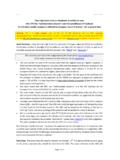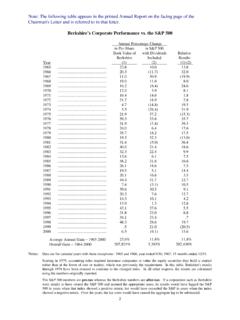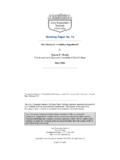Transcription of THE HIGH COURT - EUROPE versus FACEBOOK
1 THE HIGH COURT . COMMERCIAL. [2016 No. 4809 P.]. BETWEEN. THE DATA PROTECTION COMMISSIONER. PLAINTIFF. AND. FACEBOOK IRELAND LIMITED AND MAXIMILLIAN SCHREMS. DEFENDANTS. JUDGMENT of Ms. Justice Costello delivered on the 3rd day of October, 2017. Introduction 1. This is an unusual case. The proceedings have been brought in this COURT for the purposes of obtaining a ruling from the COURT of Justice of the European Union ( the CJEU ) on the validity of three decisions of the Commission of the European Union ( the Commission ) insofar as they apply to data transfers from the European Economic Area ( the EEA ) to the United States of America. The decisions are: (1) Commission Decision 2001/497/EC of 15 June 2001 on standard contractual clauses for the transfer of personal data to third countries, under Directive 95/46/EC [2001] OJ L181/19;. (2) Commission Decision 2004/915/EC of 27 December 2004 amending decision 2001/497/EC as regards the introduction of an alternative set of standard contractual clauses for the transfer of personal data to third countries (notified under document number C(2004)5271) [2004] OJ.
2 L385/74; and 2. (3) Commission Decision 2010/87/EU of 5 February 2010 on standard contractual clauses for the transfer of personal data to processors established in third countries under Directive 95/46/EC of the European Parliament and of the Council (notified under document C (2010) 593). (Text with EEA relevance) [2010] OJ L39/5 (together the SCC. decisions ). 2. The plaintiff is the Data Protection Commissioner in Ireland ( the DPC ). She is the person charged with the enforcement and monitoring of compliance with the Data Protection Acts 1988 to 2003. She is also the person designated as the national supervisory authority for the purposes of monitoring the application in Ireland of Directive 95/46/EC of the European Parliament and of the Council of 24 October 1995. on the protection of individuals with regard to the processing of personal data and on the free movement of such data ( the Directive ). 3. The DPC is investigating a complaint made by the second named defendant (Mr.)
3 Schrems), a student with an address at Schadegasse 2/13, 1060 Vienna, Austria who operates a FACEBOOK account. She has formed the view that the complaint raises issues as to the validity of the SCC decisions having regard to the provisions of Article 7 and/or Article 8 and/or Article 47 of the Charter of Fundamental Rights of the European Union ( the Charter ). In light of the Ruling of the CJEU in Case C-362/14. Schrems v. Data Protection Commissioner, EU:C:2015:650 Schrems ) 6th October, 2015, and in particular para. 65 of the Ruling she instituted these proceedings in order that the validity of the SCC decisions may be determined, either by this COURT declining to make a reference pursuant to Article 267 of the Treaty on the Functioning of the European Union ( TFEU ) on the basis that no issue as to the validity of the SCC. 3. decisions arises, or on the basis that this COURT makes a reference to the CJEU and the CJEU makes a ruling on the validity of the SCC decisions.
4 The Parties 4. The DPC joined Mr. Schrems as a defendant to the proceedings as he is the complainant whose complaint she is investigating and which gives rise to these proceedings. FACEBOOK Ireland Ltd ( FACEBOOK ) is a limited liability company which operates an online social networking service, with a registered address at 4 Grand Canal Square, Grand Canal Harbour, Dublin 2. It is part of the FACEBOOK group of companies. FACEBOOK Inc. is a US corporation, established under the laws of the State of Delaware and having its principal place of business at Menlo Park, California. It is the ultimate parent of the FACEBOOK group of companies. FACEBOOK is joined as a defendant to these proceedings as Mr. Schrems' complaint relates to the transfer of his data by FACEBOOK to FACEBOOK Inc. in the United States for processing. The DPC seeks no relief against either party. She joined them as defendants as they were the parties most concerned with the issues in order that they might engage fully in the proceedings.
5 They have each done so. 5. The case raises issues of very major, indeed fundamental, concern to millions of people within the European Union and beyond. Firstly, it is relevant to the data protection rights of millions of residents of the European Union. Secondly, it has implications for billions of euros worth of trade between the EU and the US and, potentially, the EU and other non-EU countries. It also has potentially extremely significant implications for the safety and security of residents within the European Union. There is considerable interest in the outcome of these proceedings by any parties having a very real interest in the issues at stake. 4. 6. Applications were made by a number of parties to be joined or heard in the proceedings. In the event four parties were joined as amici curiae to the proceedings. These were the United States of America, the Business Software Alliance (BSA), Digital EUROPE and the Electronic Privacy Information Centre (EPIC).
6 Each of these parties made submissions at the hearing but were not permitted to adduce evidence before the COURT . Legal Framework The Charter of Fundamental Rights of the European Union ( the Charter ). Article 7. Respect for private and family life Everyone has the right to respect for his or her private and family life, home and communications. Article 8. Protection of personal data 1. Everyone has the right to the protection of personal data concerning him or her. 2. Such data must be processed fairly for specified purposes and on the basis of the consent of the person concerned or some other legitimate basis laid down by law. Everyone has the right of access to data which has been collected concerning him or her, and the right to have it rectified. 3. Compliance with these rules shall be subject to control by an independent authority. Article 47. Right to an effective remedy and to a fair trial 5. Everyone whose rights and freedoms guaranteed by the law of the Union are violated has the right to an effective remedy before a tribunal in compliance with the conditions laid down in this Article.
7 Everyone is entitled to a fair and public hearing within a reasonable time by an independent and impartial tribunal previously established by law. Everyone shall have the possibility of being advised, defended and represented. Legal aid shall be made available to those who lack sufficient resources in so far as such aid is necessary to ensure effective access to justice. Article 51. Field of application 1. The provisions of this Charter are addressed to the institutions and bodies of the Union with due regard for the principle of subsidiarity and to the Member States only when they are implementing Union law. They shall therefore respect the rights, observe the principles and promote the application thereof in accordance with their respective powers and respecting the limits of the powers of the Union as conferred on it in the Treaties. 2. This Charter does not extend the field of application of Union law beyond the powers of the Union or establish any new power or task for the Union, or modify powers and tasks as defined in the Treaties Article 52.
8 Scope and interpretation of rights and principles 1. Any limitation on the exercise of the rights and freedoms recognised by this Charter must be provided for by law and respect the essence of those rights and freedoms. Subject to the principle of proportionality, limitations may be made only if they are 6. necessary and genuinely meet objectives of general interest recognised by the Union or the need to protect the rights and freedoms of 3. In so far as this Charter contains rights which correspond to rights guaranteed by the Convention for the Protection of Human Rights and Fundamental Freedoms, the meaning and scope of those rights shall be the same as those laid down by the said Convention. This provision shall not prevent Union law providing more extensive protection. The Treaty on the functioning of the European Union (2012/C326/47) ( the TFEU ). Article 16. (ex Article 286 TEC). 1. Everyone has the right to the protection of personal data concerning them.
9 2. The European Parliament and the Council, acting in accordance with the ordinary legislative procedure, shall lay down the rules relating to the protection of individuals with regard to the processing of personal data by Union institutions, bodies, offices and agencies, and by the Member States when carrying out activities which fall within the scope of Union law, and the rules relating to the free movement of such data. Compliance with these rules shall be subject to the control of independent authorities. The rules adopted on the basis of this Article shall be without prejudice to the specific rules laid down in Article 39 of the Treaty on European Union. Article 267. (ex Article 234 TEC). The COURT of Justice of the European Union shall have jurisdiction to give preliminary rulings concerning: 7. (a) the interpretation of the Treaties;. (b) the validity and interpretation of acts of the institutions, bodies, offices or agencies of the Union.
10 Where such a question is raised before any COURT or tribunal of a Member State, that COURT or tribunal may, if it considers that a decision on the question is necessary to enable it to give judgment, request the COURT to give a ruling thereon .. Treaty on the European Union (2012/C326/13) ( TEU ). Article 4. 1. In accordance with Article 5, competences not conferred upon the Union in the Treaties remain with the Member States. 2. The Union shall respect the equality of Member States before the Treaties as well as their national identities, inherent in their fundamental structures, political and constitutional, inclusive of regional and local self-government. It shall respect their essential State functions, including ensuring the territorial integrity of the State, maintaining law and order and safeguarding national security. In particular, national security remains the sole responsibility of each Member State. 3. Pursuant to the principle of sincere cooperation, the Union and the Member States shall, in full mutual respect, assist each other in carrying out tasks which flow from the Treaties.








